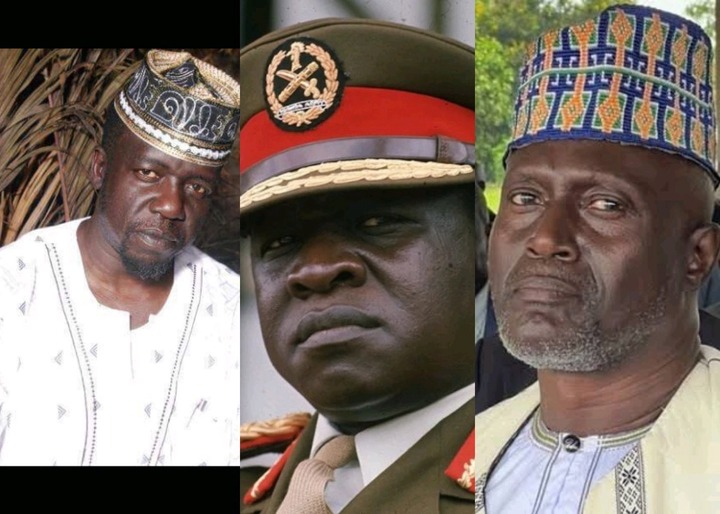The sons of Uganda’s former leaders, Idi Amin and Milton Obote, are grappling with the daunting task of reshaping their fathers’ controversial legacies. Jaffar Amin, son of the notorious Idi Amin, and Jimmy Akena and Bishop Edward Engena Maitum, sons of Milton Obote, are navigating a complex landscape of public distrust and historical pain. While Jaffar seeks reconciliation and a nuanced view of his father’s rule, Akena and Maitum struggle to gain political traction, hindered by their father’s divisive past. Their efforts highlight the enduring impact of Uganda’s turbulent history on the families of its former rulers.
Idi Amin, who ruled Uganda from 1971 to 1979, is remembered for a brutal regime responsible for an estimated 100,000 to 500,000 deaths, according to Britannica. His 1972 expulsion of approximately 70,000 Asians crippled the economy, and his erratic behavior earned him global infamy. Ousted in 1979, he died in exile in 2003. Milton Obote, Uganda’s first post-independence president (1962–1971 and 1980–1985), oversaw development in healthcare and agriculture but is criticized for abolishing traditional kingdoms and political repression, particularly during his second term, which ended with his overthrow by Yoweri Museveni in 1985.
Jaffar Amin, one of Idi Amin’s many children, has been the most vocal in addressing his father’s legacy. He defends Amin by challenging exaggerated claims, such as cannibalism, and has called for a truth commission to investigate the regime’s actions, as noted on Wikipedia. Jaffar uses social media to share family stories, aiming to humanize his father, and is working on a documentary to present “the other side of Idi Amin Dada,” according to a 2015 Foreign Policy article. He co-authored Idi Amin: Hero or Villain? with Margaret Akulia, questioning whether Amin was unfairly demonized. Beyond defense, Jaffar seeks reconciliation. In 2016, he expressed a desire to apologize to families of the Entebbe hostage crisis victims, as reported by Ynetnews. In 2024, he joined a Truth, Peace, and Reconciliation initiative in Koboko, West Nile, collaborating with religious and political leaders to heal regional divides, per Scholar Media Africa. His role in Uganda’s National Reconciliation Committee underscores his commitment to national unity.
Public response to Jaffar’s efforts is mixed. In West Nile, where Amin’s Kakwa heritage resonates, some view him as a patriot who challenged colonial powers. However, nationally, the memory of Amin’s atrocities fuels skepticism. A 2009 Standard article noted that Jaffar’s reconciliation meeting with Madaraka Nyerere, son of Tanzania’s Julius Nyerere, garnered more media attention than public support, indicating limited impact. While his 2024 initiatives show promise, many Ugandans remain wary, unable to separate Jaffar’s intentions from his father’s crimes.
In contrast, Milton Obote’s sons, Jimmy Akena and Bishop Edward Engena Maitum, focus on political engagement but face significant hurdles. Akena, a Member of Parliament and leader of the Uganda People’s Congress (UPC), founded by his father, has struggled to unify the party. His 2015 appointment as UPC leader sparked internal divisions, with many members questioning its legitimacy. Tensions escalated when his wife, Betty Amongi, accepted a ministerial role from President Museveni, Obote’s former rival. Amongi’s admission that Museveni funded their 2016 campaigns further alienated UPC loyalists, who saw it as a betrayal of Obote’s legacy. Akena’s leadership has failed to restore the UPC’s former prominence, and public distrust tied to Obote’s controversial rule persists.
Maitum has fared even worse in politics. In 2018, he secured only two votes in the UPC primaries in Apac, reflecting his lack of support. He later left the UPC to run as an independent in the Kawempe North by-election, citing his mother Miria Obote’s ties to the area. Despite no UPC candidate in the race, Maitum gained little traction, underscoring the public’s reluctance to embrace the Obote name. Unlike Jaffar, neither Akena nor Maitum has focused on reconciliation, instead prioritizing political survival, which has limited their ability to address their father’s legacy directly.
The challenges faced by these sons stem from their fathers’ actions. Amin’s regime was marked by overt violence, making Jaffar’s reconciliation efforts contentious but notable for their intent to heal. Obote’s legacy, defined by political and economic mismanagement, leaves Akena and Maitum struggling to separate their political ambitions from historical resentment. Uganda’s ethnic and regional dynamics further complicate their efforts. Amin retains some support in West Nile, while Obote’s actions, particularly against Buganda, fuel broader skepticism toward his sons.
The cases reflect broader themes of legacy and memory in Uganda. Jaffar’s proactive approach, blending defense and reconciliation, contrasts with Akena and Maitum’s political struggles, but all face resistance due to the pain caused by their fathers’ regimes. As Uganda continues to heal from its post-independence turmoil, the sons of Idi Amin and Milton Obote illustrate the complex interplay of history, forgiveness, and public perception. Whether through reconciliation or political ambition, their efforts to move beyond their fathers’ shadows remain a formidable challenge.
